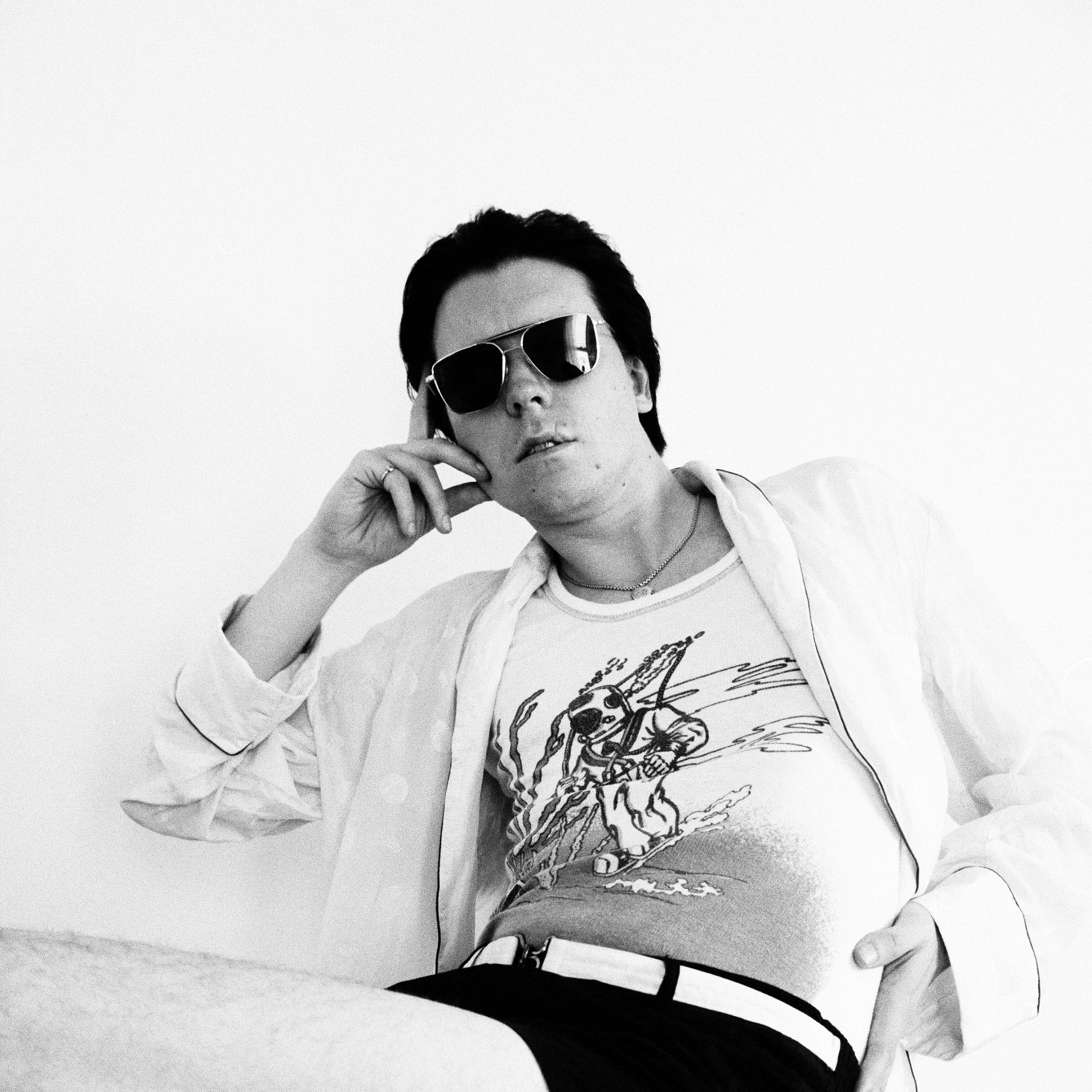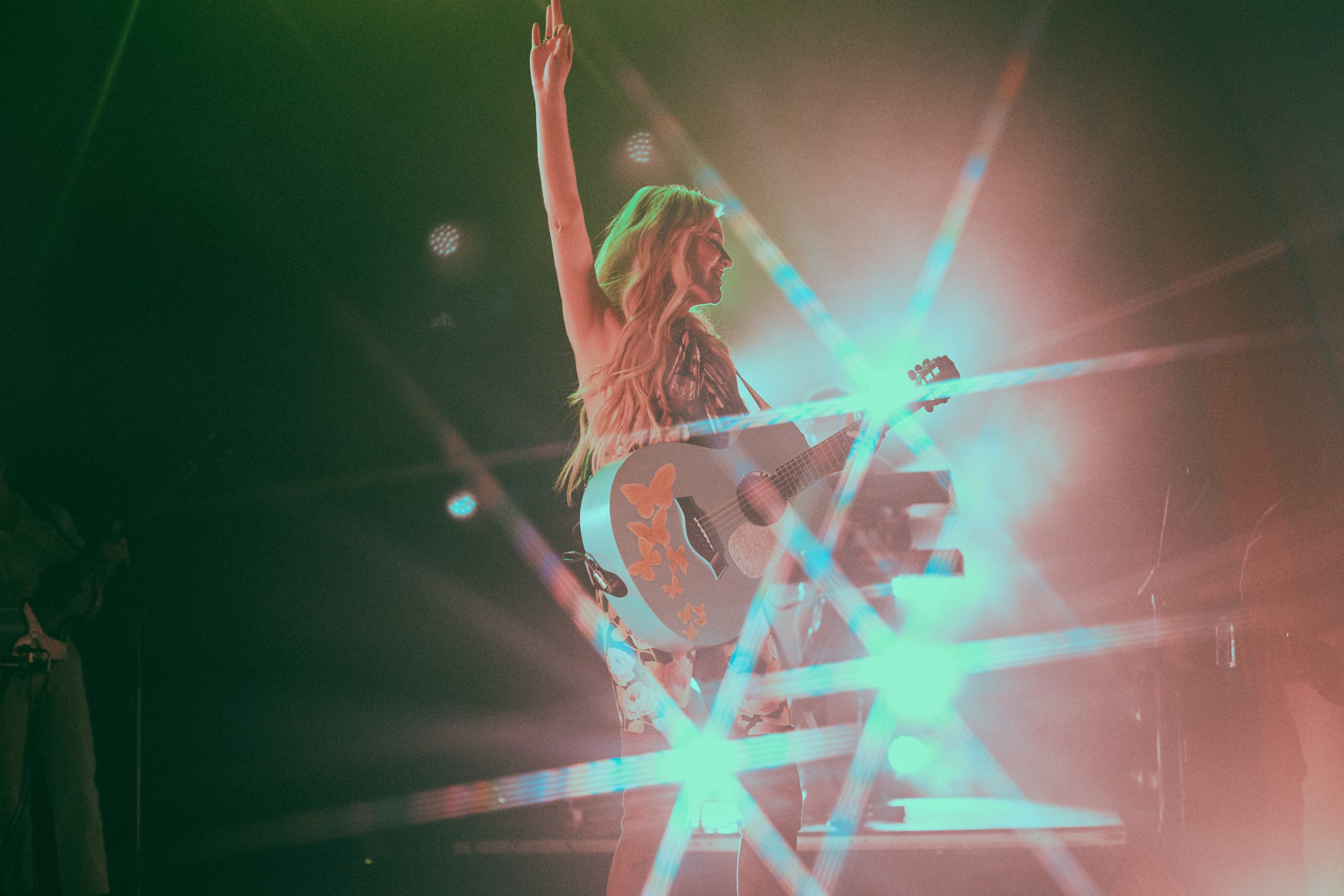Alex Cameron is the world’s greatest support act. He spoke to us about this, his new album ‘Miami Memory’ Elon Musk, Brandon Flowers, Clothes and the power of music. First published in Volume 4.
J: The new album has been announced and people are interested? How excited are you for people to hear the album? What chapter does this represent in the Alex Cameron catalogue?
A: I suppose it’s the first album I have had the chance to record in the same room, with the same players on every song, and it’s the first time I have been able to organise the exact team i wanted to make the record you know. It is produced by Jonathan Rado, who is a big brand, and I love his work, and recorded and mixed by Marta Solagni, who is an engineer I admire to the fullest, I think she is the best in the business right now. I just sort of had a real moment of clarity across a three or four-month period where I wrote all the songs on an electric piano in Queens, New York. It just feels like the first time I’ve been able to make an album in the way that everyone fantasies about.
The album is ultimately a gift to Jemima…
J: From ‘Miami Memory’ and ‘Divorce’, the songs seem to bring together the sounds of the first and second album. Is that something that has come together nicely on this record?
A: I think a lot of people have been observing that about the album, that it sounds like the child of the first two records, and I really appreciate that read, but it simply wasn’t conscious. It’s just hard to escape my own identity, and I’m certainly not trying to. I think the nature of my music is ultimately an attempt at projecting what’s going on in my head constantly when I’m walking around, those are the melodies that live inside me, and those are the words that live inside me.
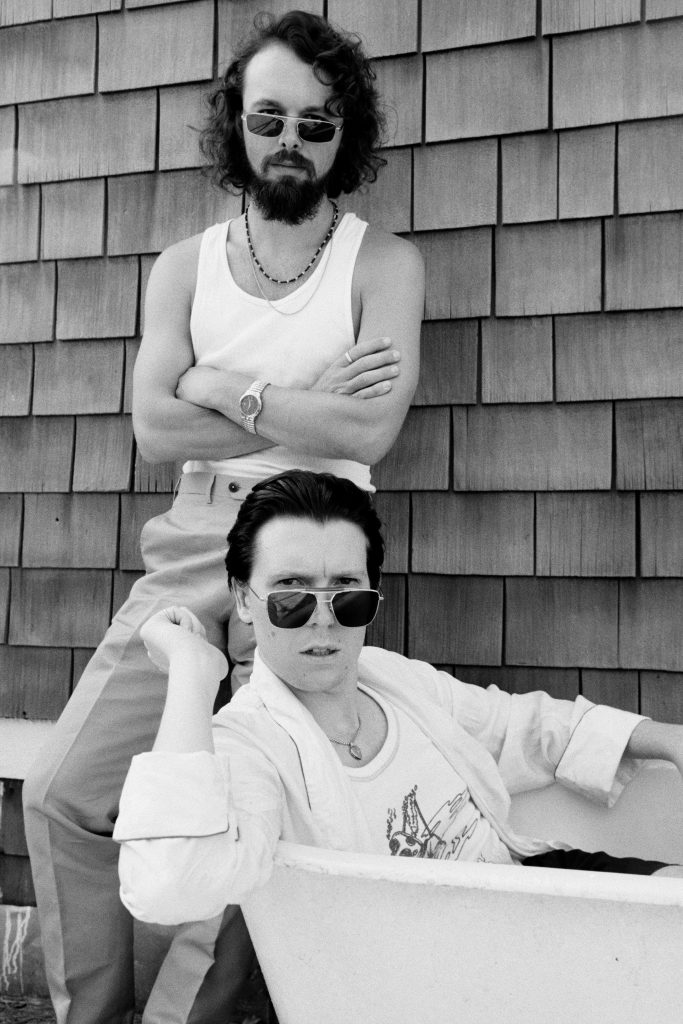
J: Speaking of some of the words, there’s a great line in ‘Divorce’ about your “friends in Kansas City with their mother fuckin’ Futon Couch”…
A: Yeah, that’s sort of like… often times when I’m frustrated I’ll make a threat about what I’ll do in order to escape a situation, say I’m arguing with someone, or I’m having a fight with my girlfriend, and I think the threat is like “I’m going to leave and do this”, you’re saying it with a sense of gravity which comes across as a sense of power, the more you speak it, the more words that come, the more you end up sounding like you’re deflating your tires a bit. It’s a little bit anticlimactic, but in those moments I realise what I’m saying, and I just don’t realise how foolish I sound.
I felt compelled to tell these stories through my own eyes as opposed to through the eyes of a character.
J: In that song, there’s also a reference to Elon Musk, what intrigues you about him? He’s quite an eccentric character.
A: He is eccentric, I mean, from what I gather and what I observe, he seems to be sort of an icon for a confused young man, that aspires to be this kind of pseudo-genius, that kind of has delusions of grandeur which seems like a perfect icon for the song.
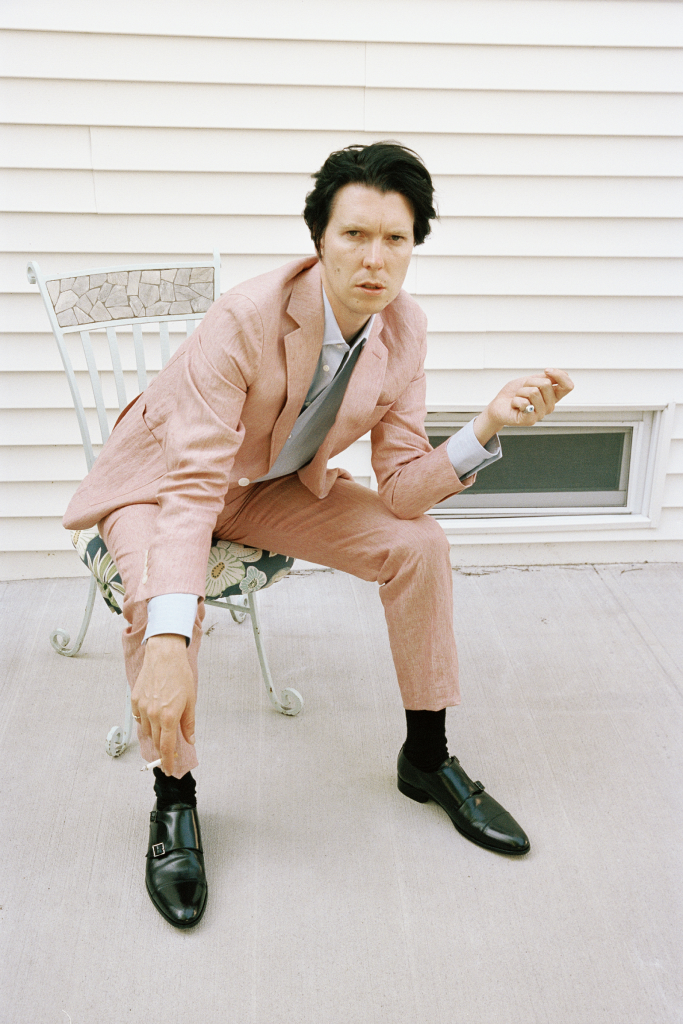
J: On the artwork, you seem to look younger once again, is there a story developing across the three?
A: I guess I see album covers as an opportunity to really display and capture how I look in that moment. I take that very seriously, the idea of being able to take a portrait that represents who the person was who made the album, without sounding like a simpleton. I take that opportunity, and so I suppose I’m always drawn to that frame. I don’t know that I’m awfully conscious of it when I’m making the decision of how [the artwork is] going to be, and it’s always a collaboration with the photographer, this latest record is also a collaboration, with my partner Jemima (Kirke) who designed the collage behind me, that’s her collage. The album is ultimately a gift to Jemima, it’s not necessarily all about her, but it is a gift for her that I wanted to give her, it kinda just aligned itself. Michael Bailey-Gates took the photographs, and he’s one of my favourite photographers at the moment.
If I’m ever talking or going off on a tangent… it’s simply taking the opportunity to speak to people in a way that shows that I’m grateful for them being there.
J: Something you’ve always been is direct, open and real, it seems like this has developed in these new songs, is this how you connect with your audience?
A: The way I try and connect with people is really through live performances you know, it’s kinda how I end up really being a part of that connection. Before, when I write songs, it’s just for a very close group circle of friends of mine, and if I can make them feel the emotions I intend to then they’re kinda my test, as well as [later] the audience. I guess I just felt compelled to tell these stories through my own eyes as opposed to through the eyes of a character.

J: Speaking of character, you still get to play the failed entertain role with songs from Jumpin’ The Shark, do you still enjoy that?
A: Oh 100 per cent, I love every single song. Any song that I’m playing live I’m playing because I want to play it, because I love playing it, and I love singing it. The songs were written in a way that they were in a brief moment, which stood the test of time, and I see myself… The more albums we add to the songbook, the
ones we take on stage, it’s just a lot of fun for me.
People say it’s hard to be a support act, but it’s even harder to be the audience for a support act…
J: I’ve seen you a few times, it’s always a fun evening with comedy and dance thrown in. Do you enjoy adding all these elements together?
A: Yeah, I’m just trying to make the most of a good situation, you know it wasn’t always the case that people were buying tickets to our shows. It’s coming up to probably 50/50, we’re playing empty rooms and full rooms, and we are still getting used to people being there. If I’m ever talking or going off on a tangent,
or developing a dialogue that I’m going to continue to use on stage, it’s simply taking the opportunity to speak to people in a way that shows that I’m grateful for them being there.
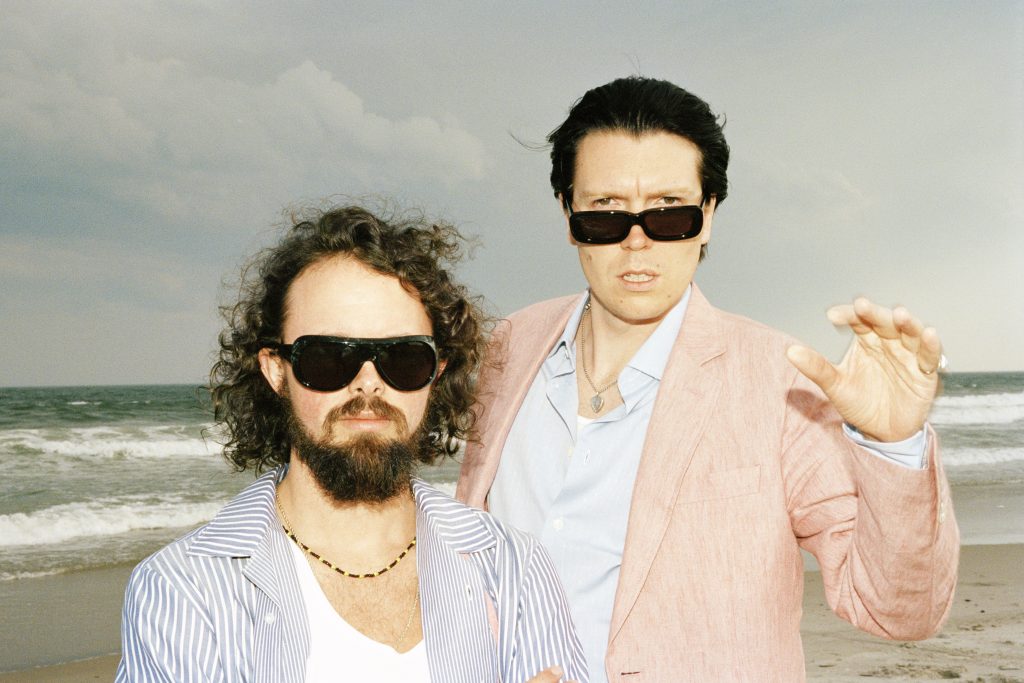
J: Speaking of full rooms, you toured with The Killers, how fun were them shows?
A: That was a completely wild experience, getting an email from Brandon in 2016, saying that he just wanted to let us know he was listening, and he liked it, to then recording and writing with him in Las Vegas, to then being invited on tour no questions asked, however much money we wanted: “let’s just do it”, that was their attitude. They just invited us in like a family, and we got to work every night in arenas around the world. We did parts of Europe and the UK, all of America and Australia, we were in towns that we couldn’t sell 150 tickets in and we were playing to 30,000 people in football stadiums, that is such a fun kind of work. People say it’s hard to be a support act, but it’s even harder to be the audience for a support act, I mean you didn’t buy a ticket to see someone dance around for half an hour, you paid to see the headline act. It’s really just my job to keep everyone at ease and make sure they don’t start booing and throwing their shit packets at us you know… it was a great test and a real honest challenge.
We actually had a deal (Alex and Brandon), he wanted to learn restraint from me, and I just wanted and was open to everything with him…
J: I think you passed the test, two songs in people were cheering for you and chanting Roy’s name.
A: My job on that point, is to try and get people on side and excited for the headline show, that’s the idea of support, if you can do it like that then you can have fun. People always tell me you know that being a support act sucks, it’s not worth it and that no one is even listening, but that’s a perspective of someone who doesn’t get it, and it’s their loss.
J: Obviously, your dream is to play those stadiums yourselves, what would you bring in terms of production? Would Roy have his cranes dotted around?
A: I would love to one day, this might sound a little humble, but to be able to afford a lighting engineer,
as I would just love to collaborate with someone to control the atmosphere we are performing in. Because now we have to rely on the imagination of people in the room. Once we can present a full show like that, and we can bring someone in who is just as much a part of the band as we are out front, then I think we will really get into an area where our shows are the best in the world.
I had to stop wearing denim on stage because it got harder to dance, things get wet… and then they get tight, then all of a sudden I was dancing, and I didn’t like the way I was dancing.
J: Going back to Brandon Flowers, what did you learn from him, and what did he learn from you
once you were in the studio together?
A: We actually had a deal, he wanted to learn restraint from me, and I just wanted and was open to everything with him, I just told him I wanted to learn how to connect with people because I felt that was what I lacked in my music. You know my music is often very self-serving, I feel like I’m just ticking boxes I want, whereas Brandon is very good at delivering what people want, so we kinda traded you know. I guess he just wanted to live his songs a little more, and I guess he’d been doing that for a while, but that kind of a challenge arises. We were just swapping formulas, and swapping ideas and showing each other how we work, we took what we liked about the other person and kept it.
J: I think you can tell in both of your works, their last album was more honest, whilst your choruses have improved for sure, which is a Killers’ trademark.
A: Yeah at some point he gifted me for the rhythms and melodies and choruses, and was like have fun with that and see how it goes. It was really amazing to see this guy channel the spirit that he channels when he is in the studio because it was real. I remember looking at Roy when he jumped on the mic for the first time, and I was like, there it is man, he can access it you know, that’s the voice right there, the one that can set thousands of people on fire, and we were just sitting there laughing like fuck me that is real you know.
I lean on [clothing] a little bit you know, to help me project the energy that I want to project. If I’m not looking good, if I don’t feel that I look good, then I have to work a little bit harder to get that.
J: He’s worn a gold suit, and you had a silver suit, would you ever bring that back for live shows?
A: He took it a notch up, there’s some friendly competition going on there.
J: Speaking of clothes, you wear a lot of denim. Are you Wrangler or Levis?
A: Oh, definitely, Levis. I had to stop wearing denim on stage because it got harder to dance, things get wet… and then they get tight, then all of a sudden I was dancing, and I didn’t like the way I was dancing. So, I switched to linen and slacks. It’s a lot more comfortable, and I can just move.
J: Clothes are very important in the modern-day, especially in the live show, do you feel they extend your on-stage persona?
A: If I’m feeling good, I know I look good, and I can do my job properly. My worst nightmare was like a couple of dates on my last tour, which Roy and I did as a duo, I’d left my clothing bag in a venue, and it was a couple of nights before it caught up with us, so I had to borrow clothes. I had to walk out on stage into a nice full room, and when you’re not wearing your best threads you know… I lean on [clothing] a little bit you know, to help me project the energy that I want to project. If I’m not looking good, if I don’t feel that I look good, then I have to work a little bit harder to get that, and I don’t want to work harder for that, and in fact, I want to know that I feel good.
If someone says I don’t want to post on the internet, well you haven’t found a way to enjoy it yet, and that’s fair enough, but that’s not the way me and Roy are.
J: On the internet, you’ve developed this brand, like the cowboy of the World Wide Web…
A: I think one of the things that Roy and I connected on, early on, was like we wanted to leave this trail of breadcrumbs behind us you know, and we want to leave a paper trail so that if you ever wanted to scroll through and access it you can see this real thing was unfolding. And we just try to make sure we maintain our attitudes and make sure we keep things in perspective, it’s a long game, and we want to be able to reflect upon it properly, so I really just try and record what’s happening using the internet, it’s a page-turner.
J: I think that’s a nice way to use it. People often use it for popularity and clickbait, it’s a nice tool to develop a history.
A: Yeah, you can tell when an account or a person is either leaning on cheap tricks or if they’re being real with their presence, and I think the other people can too, you know. What keeps it exciting for us is that it’s very real, it’s motivating in that sense, and things only get boring when you don’t like what you’re doing. If I ever hear a band saying the shows are getting boring, well I say you just don’t like the songs because the songs aren’t good enough. If someone says I don’t want to post on the internet, well you haven’t found a way to enjoy it yet, and that’s fair enough, but that’s not the way me and Roy are.
[Miami Memory] is essentially my audition tape to be part of the Greer Lankton Collection.
J: You and Roy seem to just do the things you enjoy, what do you do in your spare time on the road?
A: I take a lot of photographs. I really like taking photos with any kind of camera, like i just bought a digital camera, and I just found – I didn’t even know you could do this – but you can take a photo, then send it to your phone, and then send it straight to people, I’ve just got this link now. On tour, I love if we are at a truck stop and find something good to look at, I get out and take photographs, and then get back in the van, it just kinda resets the mind a little bit and puts me at ease. I also like shooting intimate photos, you know using polaroid or one of those brands. In a different way it’s a really nice aesthetic,
but yeah that’s mostly how I stay sane in the down times, taking photos. If I’m not taking photos, then
I’m making sure I’m travelling. Jemima and I will take a road trip through West Virginia, down through
Georgia, we go and see things and are just like “oh damn”.
J: Speaking of camera work, you tried your hand at directing for ‘Miami Memory’, how did you find moving between the two mediums?
A: Well, the concept was very literal, the concept was kinda what I wanted the song to be as well. That video clip is essentially my audition tape to be part of the Greer Lankton Collection, it was just my attempt at saying that I’m a fan, and I wish I was part of that world. I’ll never be able to be a part of Greer’s art, but I certainly wanted to try in my own way. Greer Lankton is a huge influence on me, and her partner, Paul Monroe who’s now in charge of her archive, has become a dear friend, and I just wanted to say thank you.
It’s very easy for a man to get a platform in the music industry and to waste that platform on some self-serving, meaningless song…
J: I want to talk about empowerment in your work, you’re an advocate for gender equality and removing
toxic masculinity, how do you think music can change that?
A: Well I think, I’m putting my money where my mouth is, it’s more than just pre-developed something or a performance of some shallow act. I like to inject how I see things into my songs so that it’s in the fabric of who I am as an artist, and I think ideally – it may be a stretch – but I’d like people to consider certain ideas based on the stories I tell, and that there’s a moral to the stories you know… that’s just how I was taught to tell stories
J: We see many male artists quite closed off in their songwriting, is that something that needs to change moving forward?
A: There’s a variety of ways to look at that, and one of them is that it’s very easy for a man to get a platform in the music industry and to waste that platform on some self-serving, meaningless song. I think that is the worst kind of exploitation of the position, acting without accepting the responsibility of being a popular musician. As for why men are closed off, it’s probably because they’re embarrassed and ashamed of themselves in some way.
J: I look at your writing, and people like Stella Donnelly and that kind of songwriting is what speaks
to me, it’s honest and a log of what’s going on right now, do you think music can capture society in that
way?
A: I think so absolutely, I think that the trend of people underrating the impact that art can have on a community will dwindle… Music is ultimately and fundamentally an opportunity to hold a mirror up to society – on a theoretical level – and that’s the most rewarding and most enjoyable way to treat working creatively: you have an opportunity to comment.
J: Now, before you go, you’ve got shows coming up in the UK this September, please tell us, are all the
associates coming with you or is it just Roy?
A: It’ll be the full band, rhythm section, Henry and then Justin Nijssen. We haven’t exactly announced it yet, but Jack Ladder is coming along with us to be the support act, and he will play with us on stage,
and we have a new guitar player called Lyra Larsen… She’s a motherfucker playing electric guitar. We’ve got a really solid crew, and it’s going to be a lot of fun.
Listen to Alex Cameron’s new record on Spotify and Apple Music. Find his tour dates here. This was originally printed in Volume 4, but, you can find an interview with Stella Donnelly in Volume 5 below.

